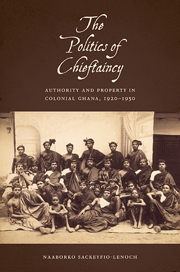Book contents
- Frontmatter
- Dedication
- Contents
- List of Illustrations
- Acknowledgments
- Abbreviations
- Introduction: Contesting Space and Authority in a Colonial Capital
- 1 Situating Ga Institutions in the European Colonial Milieu
- 2 Land Legislation, Commodification, and Effects in Accra
- 3 Negotiating Chieftaincy, the Ga Stool, and Colonial Intervention
- 4 Succession Disputes, the Ga State Council, and the Future of Chieftaincy
- 5 Contesting Property in Accra and Its Periurban Locales
- Conclusion
- Notes
- Bibliography
- Index
3 - Negotiating Chieftaincy, the Ga Stool, and Colonial Intervention
Published online by Cambridge University Press: 05 October 2014
- Frontmatter
- Dedication
- Contents
- List of Illustrations
- Acknowledgments
- Abbreviations
- Introduction: Contesting Space and Authority in a Colonial Capital
- 1 Situating Ga Institutions in the European Colonial Milieu
- 2 Land Legislation, Commodification, and Effects in Accra
- 3 Negotiating Chieftaincy, the Ga Stool, and Colonial Intervention
- 4 Succession Disputes, the Ga State Council, and the Future of Chieftaincy
- 5 Contesting Property in Accra and Its Periurban Locales
- Conclusion
- Notes
- Bibliography
- Index
Summary
The dramatic shifts and increasing tensions in land affairs explored in the previous chapter intersected with an equally contested arena of Ga political life in colonial Accra: chiefly authority. Relations of authority in the chieftaincy system were recast because chiefs had already entered into the uncertain terrain of indirect rule that compromised their role and actions within their communities. During the late 1910s and 1920s, Ga authorities appropriated destoolment practices—the political and ritual removal of a chief from a sacred stool for breaking oaths made to constituents—to question the nature and power of chiefly authority. This period constituted a watershed because the destoolment movements provided a new tool for exercising and contesting authority and legitimacy and a medium for critiquing the role of chiefs within the colonial system. Destoolment entailed a rigorous engagement with the ideals of chieftaincy and a method for making sense of changing times and disruptions in political authority. For the Ga people the power behind this new tool resided in the ability of authority holders, including the asafoi (young men's associations) and commoner groups such as manbii (townspeople), to assert themselves by critiquing and influencing the interpretation and practice of chiefly authority.
Chieftaincy disputes and destoolments throughout the colony dramatically increased beginning in the 1920s. The categories of people involved in the destoolments often remained the same, with groups such as asafoi and manbii reinforcing their power and asserting themselves more forcefully in chieftaincy politics. The methods the Ga used to contest and highlight problematic chiefly rule and especially the ideas they chose to embrace in their critiques of chiefly misconduct marked a new phase in Accran politics.
- Type
- Chapter
- Information
- The Politics of ChieftaincyAuthority and Property in Colonial Ghana, 1920-1950, pp. 72 - 93Publisher: Boydell & BrewerPrint publication year: 2014



